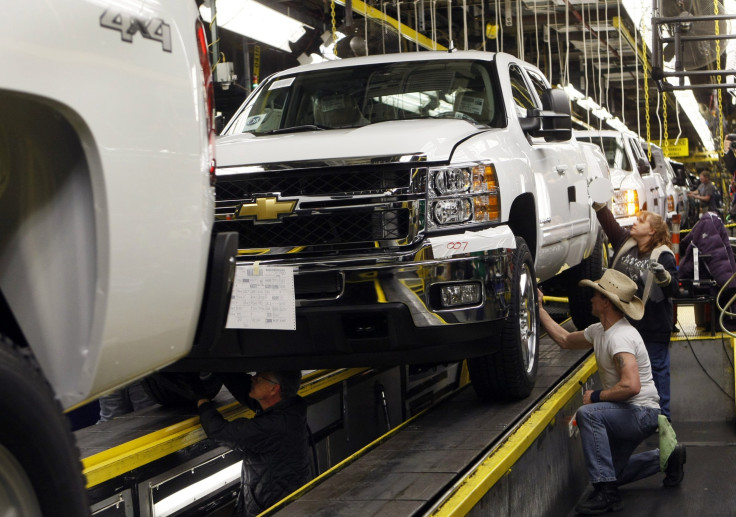General Motors (GM) First-Quarter 2014 Earnings: GM Will Take A $2B Hit In Quarter, But Analysts Look At Revenue Growth, See Core Strength

Top automakers are relying heavily on Chinese and American customers to offset sluggishness in Europe, which augurs well for General Motors, with its outsized presence in both markets that is helping counterbalance losses linked to its massive global recall and German restructuring costs.
The cost of recalling 6.3 million vehicles worldwide, including 2.6 million cars in North America linked to a faulty ignition switch, is expected to feature prominently when General Motors Co. (NYSE:GM) releases its sales and earnings for the first three months of the year on Thursday, before markets open in New York.
For the period ended March 31, Detroit-based GM, the world's third-largest automaker, is expected to record net income of $134.6 million, or 9 cents per share, on average, according to analysts polled by Thomson Reuters. Excluding items, including currency devaluation, GM earned 67 cents per share in the same period last year.
The significant drop in earnings this year stems from the company's decision to book recall-related charges in the just-ended quarter, rather than spreading them out. That amounts to at least a $1.6 billion hit, excluding a special $400 million charge previously announced by GM linked to Venezuela’s currency devaluation, and the halt in production at the company’s two factories there.
“That’s why you’re seeing such a large falloff in profit right now,” Morningstar analyst David Whiston said. “If you factor in the $1.3 billion pretax charge [for recall-related expenses], that should explain the bulk of the charge.”
GM said that the charge will cover all costs related to repairing recalled vehicles and offering about 13,000 loaner cars to customers affected by the ignition switch recall, which has been linked by the company to at least 13 deaths.
In a conference call in February, Chuck Stevens, GM’s chief financial officer, said the automaker expected to book an additional $1.1 billion in charges related to shutting down its Opel factory in Bochum, Germany, and severance for workers as it pulls out of Australia. Stevens said that the company expected to book about $380 million of that $1.1 billion in the first quarter for restructuring in Europe, Australia and Brazil. In all, these three charges total about $2 billion.
Revenue is forecast to have increased 4.2 percent to $38.43 billion, a rate of growth that has analysts looking past the recall to GM's core performance, connected largely to selling more higher-margin trucks and SUVs in North America. GM reinitiated a quarterly dividend in March for the first time since the company emerged from Chapter 11 reorganization in June 2009 and held its initial public offering in November 2010.
“We remain constructive on GM and believe the current valuation presents a buying opportunity in the back half of the year,” Goldman Sachs' analysts Patrick Archambault and David Tamberrino, wrote in a research note.
Market watchers believe the GM recall offers an opportunity for investors to buy or stay long on the company’s stock, which has shed nearly 17 percent since the start of the year, closing Monday at $33.98. “As a reminder of where we stand on GM shares: going long GM is our top investment idea,” JPMorgan analysts Ryan Binkman, Samik Chatterjee and David Kanovsky, wrote in a research note earlier this month.
© Copyright IBTimes 2024. All rights reserved.












